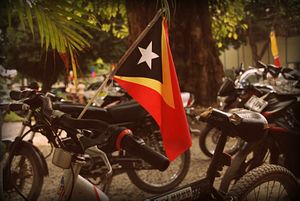There is a lot of doom and gloom about the possibility of Timor-Leste becoming a failed state. Caution is understandable, as failed states create regional instability. However, there is a tendency to overlook the positive steps that Timor-Leste takes toward stability.
At first, during Timor’s struggle for independence, the ongoing narrative was that the country would never achieve independence, and was foolish to try. Now, an independent Timor-Leste is considered the most democratic nation in Southeast Asia, according to the Economist Intelligence Unit. But the narrative remains dark: Timor-Leste is heading toward becoming a failed state, toward economic collapse and toward increasingly poor living conditions for its citizens.
We need to consider that this young nation is only 15 years old. It can be argued that while still fragile, Timor-Leste shows signs of solidifying its position in the region. According to the Fragile State Index, indicators show that Timor-Leste is overall progressing toward becoming a more stable state. States and regional neighbors would be wise to acknowledge this potential.
It has long been argued among external observers that Timor-Leste is heading toward becoming a failed state, as the state is over-reliant on oil income. While concerns about a non-diversified economy are valid, this narrative neglects to consider the difficulty post-conflict states have in attracting foreign investment. Being blessed with natural resources allows a country like Timor-Leste to fund its own development during the arduous process of attracting external investment. And this investment is coming. In 2012, Heineken established a factory in Timor-Leste to supply the local region. This factory is the first of its kind in the country. The establishment of a global brand paves the way for other businesses to establish themselves in Timor-Leste, helping the country move toward a more diversified economy.
Still, the biggest contributor toward GDP is oil income. However, the way these oil profits are managed goes against the failed state hypothesis. All the profits are deposited into the Petroleum Fund, which was modeled on Norway’s sovereign wealth fund. The depositing of oil profits into this fund allows Timor-Leste to avoid the “resource curse” by allowing full transparency on the investment and withdrawal of funds. The profit from these investments is used to pay for public services and develop strong institutions without depleting the principle. Using dividends to cover public spending does not put Timor-Leste in the perilous failed state position that some forecast.
The World Bank’s World Development Report states that conflict and violence are key influencers of poverty. Countries that are peaceful and stable are escaping poverty. Since independence in Timor-Leste, only one bout of violence has broken out, with no wide-scale violence in the past ten years. Former military members have integrated back into their communities, as opposed to causing internal disarray or forming militias. According to the Global Peace Index, Timor-Leste is in the top third of the world’s peaceful countries. The lack of conflict within Timor-Leste creates an optimal environment for development toward continual economic and social growth.
Economic development is only half the story. Social development is vital in progress to becoming a stable state. According to the United Nations Development Program’s Human Development Index, Timor-Leste ranks in the Medium Human Development category, scoring higher than several other countries in Southeast Asia. This is no small feat in a country were infrastructure was burnt to the ground on the departure of Indonesian forces.
Another key marker of development is the fight against malaria. There has been a 97 percent decrease in reported cases of malaria within Timor-Leste, from 223,002 in 2006 to 6,202 in 2012. In 2016, there was only 95 cases countrywide. Timor-Leste is fast moving toward eradicating this disease within its borders. Continual social development will allow better outcomes for the citizens of Timor-Leste.
Post-conflict states are fragile and concerns of failure are warranted. However, it is important not to let such concerns override achievements and progress toward stability. By making progress toward a diversified economy with proper management and careful budgeting of state owned investments, fostering a peaceful society, and achieving solid development goals, Timor-Leste is moving away from the fragility of being a post conflict state. When Timor-Leste achieves stability and a consistently growing GDP, it will be in a prime position to assist other states and their neighbors to negotiate their way toward stability. It is time that we recognize achievements alongside potential pitfalls to balance out the narrative.
Tahnee Reed holds three MAs from universities in Europe, including the University of Amsterdam. She is now working as a Political Affairs Officer at the Embassy of Timor-Leste. Tahnee contributed to this article in her own personal capacity. The views expressed are her own and do not necessarily represent the views of the Government of Timor-Leste or associated institutions.
































